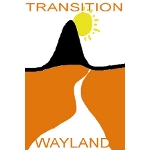I wrote some time ago about needing to do something beyond my own backyard. It didn’t take long before I figured out what that should be. Transition!
(Almost exactly a year ago I attended Transition training in Boston. You can read about it here and here.)
Taking advantage of a rare intrepid, or should I say now-or-never moment, I called my library to reserve the Meeting Room for
- an introductory talk about Transition Initiatives by Tina Clarke
- a book club for reading Rob Hopkins’ Transition Handbook (three evenings)
- three movie showings – not decided yet which ones, probably one on peak oil (or should I say peak everything?), one on our food predicament, and one on the economic situation.
I know that’s a lot of events, and it’s all just to find fellow initiators, that is, to get to the first stage of starting a Transition Initiative. Though I hope that, simply by speaking to people to get them to come to these events and advertise in their communities and newsletters, I will find some before April.
I let the date depend entirely on the availability of the Meeting Room, and so April it is (I’m lucky, some town’s Meeting Rooms are booked for over a year). And so…
April 2011 will be Wayland Transition month!
~
Meanwhile I also reconnected with the trainers and the fellow transitioners on my state’s Transition ning site, where we explore our values, share our practical efforts and look for news and support. One of my first discussions was about localization, and I shared some thoughts on “being local”:
As I am calling around my town, trying to get places to hold the Transition Wayland events in April 2011, I am confronted (in a good way) with “the locals” and especially with the question: “Am I a local?”
The I in question – that’s me – knows the answer: yes! It took me a while to get to it, but that’s a different story.
I speak with an accent. I’m from Belgium (Dutch-speaking), I moved here 13 years ago (and moved into this town, 2 years ago), and I speak English well enough, but people think I’m from Ireland (go figure).
On the phone with the library’s administrative assistant, organizing the book club for Rob’s *Handbook*, I was (kindly) asked: “Are you from here?”
Are you a local?
I said, “Now I am!”
It brought home to me the welcome principle – which Sharon in Casaubon’s Book and several other have been espousing (cf. Adapting in Place) – that our home, our place, our locus is, simply, where we live.
So not, per se, “where we come from”. Though it is great, I hasten to add, to also have come from here (wherever you are), to have stuck around until now, to have already gotten to know your place and the people, and to be known. But we should not let the lack of such a past deter us from being “a local”. If circumstances or one’s own choice (poor or not) have only just brought us here, so be it. It’s about now, and the future.
I have let the lack of such a past (not an American, not a New Englander, not a Waylander) deter me. It made me shy, made me feel undeserving, in a sense, like I should be an observer for a while and wait for an invitation, to deserve a voice. But now I am beginning to think that it might give me an edge, this ignorance about how things are done in this town, the fact that no one knows me. This was an important realization for me, and one of the factors in getting me going again.
So you could say I’m inviting myself, or rather, have already invited myself, and so, true, I am new, but hey, I am here!

That was the perfect answer to the question. And you’re right, that definition is the only one that makes sense. Local is here and now. I experience the same thing on a different level, because Southerners in the US consider themselves very distinct from Northerners, or those from the North. Having grown up in Chicago, I am a Northerner, never mind that I’ve lived in the south for almost 30 years. I consider myself local, but the Locals don’t!